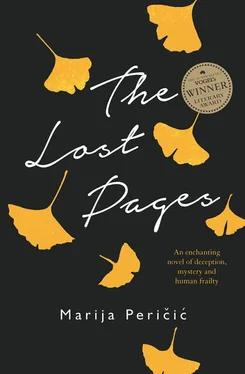This could be my chance. ‘Hence the letter,’ I said, prompting him to go on, but he was silent. I continued, ‘Have you had the pleasure of meeting Theodor yet?’ I tried to sound casual and uninterested, but even I could hear the anxiety straining at every syllable. I wished I had not spoken.
Franz ignored my question. ‘I heard that Uta was lavishing you with attention,’ he said. He looked amused, and I felt the prickle of irritation that Uta always brought with her. I wondered how Franz had come to hear about her.
‘Uta is a nice girl, but unfortunately I am allergic to her. She causes me to suffer from a terrible nausea when I am exposed to her for any length of time.’
Franz laughed at my joke, but it was true. I found there to be something viscerally repulsive about her; her flesh, or what I had seen of it, was too soft, too pliant, and gave off the fetid odour of overripe fruit.
I was at that time in the—for me—unfamiliar and privileged position of being able to reject women’s advances, which, since I had become well known in literary circles, suddenly seemed to come from all around. This had the perplexing and wholly unexpected effect of making women far less attractive to me than before. A few years earlier I would never have dreamed that I would be plagued by such a lack of attraction to women.
In the days of my obscurity I was like a sensitive machine built to detect the attractive aspects that lay in all women, no matter how faint or tarnished, and then magnify them until the woman had become absolutely irresistible to me. No woman was spared—housemaids, flower sellers, the aged wives of my father’s friends; it did not matter who they were, I would feel drawn to them for some minute characteristic that was so distilled, so rarefied that it barely existed.
I would happen to stand behind a woman on the tram, for example, and become captivated by the mobile curve of her neck, which ran from the lobe of her ear to her shoulder, and this curve would become the foundation of a whole lustful sequence of imagining. This sequence would grow and grow, and when the woman stepped down from the tram a few stops before my own destination I would feel a blind impulse to run after her, as though I would certainly die if I lost sight of her. Sometimes I actually would follow her, leaping from the tram at the last moment. My eyes would be riveted to her as I followed her through the crowd as if my gaze were a fine wire that was attached to her, and with which she pulled me along in her wake. Everything else around me—the streets, the crowds—would fade and disappear, until she suddenly turned into the doorway of some apartment building or office, and the connection would be broken. I would be left standing on the footpath, unmoored, with no idea where I was. This woman would linger in my memory until the next one took her place in an unending procession of unattainable objects of attraction, an unbreakable chain of frustration and thwarted desire.
After I became well known, though, women would approach me and I would feel nothing. I would desperately try to seek out things in them that would attract me, little hooks on which I hoped to snare myself, but I was invariably disappointed. Occasionally I would feel a hopeful stirring of interest but, at the sound of a too-shrill voice or a down-covered cheek, the interest would die away again.
The desire I felt at the party for Anja Železný was like a return to my old mode, and I welcomed it with a sense of relief. But with it, too, came attendant worries and anxieties. Would she return my affection? Might she already have a lover, or prefer someone else—Franz for instance. His handsomeness blazed out at me again, and I remembered the look on her face as she had searched the crowd for him.
I had no idea if Franz had a lover. Up until that night I had never thought of Franz in relation to anything other than writing. That he had emotions and relationships had never occurred to me, as if he did not exist in the world. It struck me that I would not like to have him for a sexual rival as well as a literary one. The possibility of him attracting the attention of Fräulein Železný the way that he had attracted Theodor made me forget all about the letter. My mind filled with paranoid thoughts of Franz and Anja together.
Though I knew it was unlikely, I had to ask Franz if he knew Fräulein Železný. I began to feel almost superstitious about the question: as though the only way to avert certain disaster was by asking, but I found that I did not know how to formulate the question. ‘The nausea is a problem,’ I said, and then added clumsily, ‘but from Anja Železný I get not a hint of it.’ I gulped at my beer to hide my embarrassment.
‘Anja Železný,’ he repeated, and began nodding slowly. I waited for him to continue, but he just reached for his beer, silently drank the dregs of it and then placed his glass down again. It made a hollow sound on the wooden table.
‘Do you know her?’ I hated myself for pressing him.
He picked up his empty glass and examined the sediment that lay at the bottom as if I had not spoken. My body was hot with embarrassment at having exposed my obvious interest.
‘Uta, Anja,’ he said. ‘It looks as though you have too many women in your life. Too many is as bad as not enough.’
‘I know which I would prefer.’
‘In that case, shall we go now and find ourselves some more women?’
‘Go? Where?’
‘Corpse Lane. Don’t tell me you’ve never passed through there on a midnight walk.’
Corpse Lane was the common name given to Der Hohler Weg, a narrow laneway that intersects the Little Quarter. It got its nickname long ago when it had been the thoroughfare to the local graveyard, now disused, and funeral processions used to pass along it. Corpse Lane’s main traffic now was quite the opposite of bygone days; mostly young men, alone or in small groups, looking in the many windows of the houses there and examining the girls on display, girls that could be bought. Franz’s assumption was correct: I had passed along Corpse Lane on several occasions. To make this journey was something of a rite of passage for the young men of my city, although for me undertaking that journey was always a source of shame. [6] This last paragraph was written in different ink, which has been verified as dating from the 1960s at the earliest. This suggests that Brod reviewed the material shortly before his death.
WE LEFT THE BEER HALL AND CROSSED THE RIVER AT THE Karlsbrücke, which was almost deserted at that time of night. The statues of the saints that squatted along the walls raised their dark heads against the clouds and I felt uneasy passing under their stone gaze. On the other side of the river we climbed up the steep streets of the Little Quarter. There were no lights here, and hulks of broken buildings crowded the narrow and twisting lanes. It began to rain very gently. On my previous visits I had always come alone and furtively, with my coat collar pulled up and my hat pulled down and my heart shuddering as I hurried along, terrified of discovery. But Franz amazed me; his demeanour was of such calmness that he could have been walking anywhere, for any purpose. He sauntered along, loose-limbed, and nodded to passers-by as though he were taking a turn in the city park on a Sunday afternoon.
When we had entered the steep canyon of Corpse Lane, lighted windows began to appear above us, orange and pink squares on the black walls that framed here one pretty girl plaiting her dark hair, and there an older girl, less pretty, her elbows resting on the windowsill as she looked out into the dark. Some of them called down to us, and Franz would respond with a little joke, evading them.
Читать дальше












